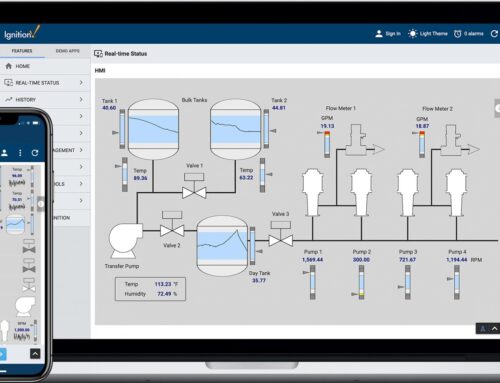Introduction: Tracking Batch Output of Rubber/Plastic Recyclers in Real Time
In teh ever-evolving landscape of recycling, maintaining efficiency and accuracy in tracking batch output is paramount. For rubber and plastic recyclers, real-time tracking not only enhances productivity but also ensures environmental compliance and operational clarity. Harnessing the power of cutting-edge technologies like Ignition SCADA (Supervisory Control and Data Acquisition) systems allows recycling plants to monitor and manage their batch processes seamlessly. This article delves into the intricacies of real-time batch output tracking and presents actionable insights to optimize operations.
With the rapid advancement of industrial automation, deploying a comprehensive tracking mechanism has never been easier. Ignition stands out as a powerful tool, offering a multitude of features crafted specifically for industries like recycling, which require meticulous monitoring and control systems. Here’s what makes real-time batch tracking with Ignition a game-changer:
- Seamless Data collection: Gather data from various sensors and PLCs (Programmable Logic Controllers) across the plant floor in real time. Such as, monitor the output of plastic granulators and sorting units continuously to ensure consistent quality and output.
- Dynamic Visualization: Utilize real-time dashboards and custom HMIs (Human-Machine Interfaces) to visualize critical metrics. This helps operators track batch progress at a glance and make informed decisions promptly.
- Enhanced Reporting and Compliance: Generate detailed batch reports automatically, ensuring adherence to both internal quality standards and external environmental regulations. This replaces traditional, error-prone manual logging processes with a more reliable, automated system.
- Improved Decision Making: provide plant managers and operational staff with up-to-the-minute data,empowering them to address inefficiencies swiftly and optimize resource allocation.
- Scalable Solutions: Whether dealing with small-scale operations or large networks of recycling facilities,Ignition’s architecture supports scalability,offering a customizable and future-proof solution for growing businesses.
Through the transformative capabilities of ignition, rubber and plastic recycling plants can achieve unparalleled levels of efficiency and sustainability. This article will explore each aspect in detail, offering expert guidance on implementing these systems effectively, driving both environmental and economic benefits.
Maximizing Efficiency with Real-Time Batch Monitoring in Rubber and Plastic Recycling
In the dynamic world of rubber and plastic recycling, real-time batch monitoring using tools like Ignition can profoundly impact operational efficiency. By leveraging Ignition’s comprehensive data integration capabilities,recycling plants can track every phase of the batch lifecycle,from the input into granulators to the final sorting stage.This continuous monitoring supports operators in making informed decisions swiftly,consequently optimizing throughput and reducing waste. for example, if a facility processes mixed plastic waste, operators can immediately detect and address any non-compliance with quality standards, ensuring only recyclable materials progress through the system. Such agile interventions could prevent costly downtime and preserve the quality of output materials, thereby enhancing the overall operational efficiency of the plant.
- Real-Time Alerts: Configure the system to issue immediate notifications if there are discrepancies in batch weight or composition, prompting swift corrective actions.
- Performance Dashboards: Utilize advanced data analytics to display performance metrics on intuitive dashboards, providing insights into batch processing times and resource utilization.
- Environmental Reporting: Automatically generate comprehensive reports that detail emissions, energy consumption, and batch success rates, crucial for regulatory compliance and sustainability audits.
By integrating these capabilities, rubber and plastic recyclers not only maximize efficiency but also strengthen their commitment to sustainable practices. Embracing real-time data analytics translates to comprehensive oversight, fostering improvements in both productivity and ecological responsibility.
Implementing Ignition: An Integrated Approach for seamless Batch Tracking
In the complex landscape of rubber and plastic recycling, leveraging Ignition for batch output tracking offers a transformative solution that is both comprehensive and efficient. Ignition’s integration capabilities enable the centralization of data from disparate sources, such as PLCs and sensors spread across granulators and sorting systems.This integration facilitates the creation of a unified data environment were users can monitor batch progress in real-time. For instance,by employing Ignition’s Tag Historian module,operators can store and retrieve historical data with ease,ensuring that each batch’s output is tracked with precision. Moreover, customized visualization dashboards can be developed using ignition’s Perspective and Vision modules, allowing stakeholders to access critical metrics like throughput and yield with ease.
by implementing Ignition, recyclers can replace traditional manual logs with automated reporting tools, enhancing both accuracy and efficiency. The software’s scripting capabilities allow for the automation of data recording,reducing human error and freeing up valuable operator time. Such as, rather than manually logging the weight and composition of sorted plastics, a custom Ignition script can automatically export this data at the end of each batch cycle. With real-time metrics at their fingertips, users can employ these insights to focus on optimizing processes and improving environmental compliance. Tracking key performance indicators such as energy consumption, carbon footprint, and waste diversion becomes streamlined, enabling facilities to meet sustainability goals while addressing regulatory requirements efficiently.
Leveraging Data Visualization for Insightful Environmental Reporting
Leveraging data visualization tools within platforms like Ignition allows recycling facilities to not only track batch output but also generate insightful environmental reports.For instance, by deploying real-time dashboards that gather data from granulators and sorting systems, operators can visually interpret metrics such as average processing volumes, material conversion rates, and environmental impact statistics. Operators can monitor how efficiently input materials like rubber and plastic are being processed into reusable forms, aiding the identification of bottlenecks in production that may otherwise increase energy consumption or waste generation. In addition, real-time alerts on performance deviations—triggered by anomalies in data trending—enable swift corrective measures, maintaining operational efficiency and minimizing environmental impacts.
Consider a scenario where data visualization highlights an unusual spike in energy usage by the granulator. This anomaly can be further probed to reveal inefficiencies such as worn equipment or mis-alignments affecting throughput and electricity use. Furthermore, data presented in intuitive graphical formats supports authoritative environmental reporting required by regulatory bodies. Through visual mappings of KPI trends, stakeholders can compare current output against industry standards or regulatory thresholds, facilitating compliance and improving transparency. such insights can also guide strategic initiatives, whether retrofitting machinery for enhanced performance, adopting new sorting technologies, or adjusting operational parameters to reduce overconsumption of resources, thereby reducing the carbon footprint.
Best Practices for Achieving Accurate and Reliable Real-Time metrics
Accurate and reliable real-time metrics are fundamental for optimizing the efficiency of rubber and plastic recycling processes. Implementing best practices begins with the seamless integration of data collection systems, such as Programmable logic Controllers (plcs) and sensor networks, into your operational framework. Standardizing data protocols is crucial for ensuring that disparate systems communicate effectively. As an example, using OPC UA (Open Platform Communications Unified Architecture) allows for the seamless integration of equipment data streams into the Ignition platform. This approach not only reduces latency but ensures that all data points are synchronized to reflect real-time metrics accurately.
To maintain the integrity of real-time data, it’s vital to implement robust data validation protocols. Techniques such as filtering out anomalies and ensuring consistent timestamping can be critical. For example, leveraging predictive analytics with machine learning algorithms can definitely help identify when data points, like temperature or machine speed, deviate outside expected ranges, allowing for automated corrective actions. Additionally,centralizing data storage in a SQL warehouse within Ignition facilitates instant access to historical data,which supports trend analysis and predictive maintenance. Embrace visualization tools in Ignition to format the metrics into user-friendly dashboards, thus enabling operators to gauge operational performance at a glance, identify bottlenecks immediately, and make informed decisions swiftly. This holistic approach not only improves operational efficiency but also contributes to sustainability efforts through precision tracking of batch outputs and reduction of resource waste.
Insights and Conclusions
real-time tracking of batch output in rubber and plastic recycling plants offers notable advances in operational efficiency, quality control, and environmental accountability. By leveraging systems like Ignition, facilities can gain comprehensive insights, including:
- Accurate batch tracking: Automated capture and analysis of batch data improve transparency and traceability.
- Quality assurance: Instant feedback on production metrics ensures adherence to compliance standards.
- Environmental impact: Monitoring emissions and recycling rates supports sustainability goals.
- Operational efficiency: Real-time alerts and data-driven decisions optimize workflow and minimize downtime.
These technological advancements position recycling plants at the forefront of the green economy, promoting sustainable practices that meet stringent regulatory demands while maximizing profitability.We invite you to explore how Innorobix, with its tailored solutions and innovative approach, can transform your recycling operations. Whether you wish to enhance your existing systems or require a comprehensive solution, contact us for a consultation or to schedule a live demo, and take the first step towards a smarter, more efficient recycling process.
















